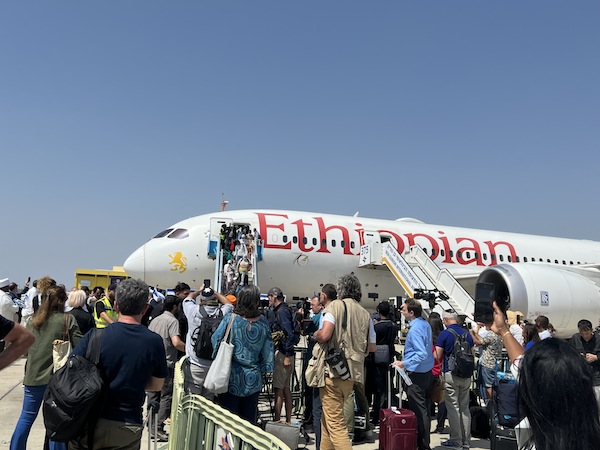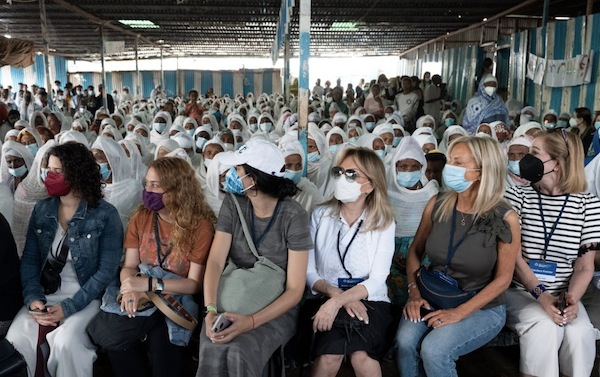Candance Kwinter, far right, and other members of a foreign delegation to Ethiopia, take in a synagogue service in Gondar. (photo from Candace Kwinter)
The latest airlift from the Horn of Africa is underway – and a Vancouver community leader was on the plane from Addis Ababa recently with 179 Ethiopian Jews making aliyah.
Candace Kwinter flew to Ethiopia at the end of May, where she met up with three other Canadians, a group from North and South America and a team of Israelis. In addition to being chair of the Jewish Federation of Greater Vancouver, Kwinter is on the board of the Jewish Agency for Israel and sits on numerous JAFI committees.
Pnina Tamano-Shata, Israel’s minister of immigrant absorption, who was born in Ethiopia in 1981 and is the first Ethiopian-Israeli cabinet minister, was also on the trip. So was Micah Feldman, author of the book On Wings of Eagles: The Secret Operation of the Ethiopian Exodus, who was able to contextualize what first-timers were witnessing.
A trickle of Jewish refugees has traveled from eastern Africa to Israel (and pre-state Palestine) since the 1930s, at least. From the beginning of the Ethiopian civil war, in 1974, through the catastrophic famine on the Horn of Africa in the early 1980s, rescue missions ramped up. Operation Moses, in 1984/85, brought about 8,000 Ethiopian Jews to Israel, primarily from refugee camps in Sudan. Operation Solomon, in 1991, brought more than 14,000 Ethiopians.
The current airlift, called Operation Tzur Israel (Rock of Israel), is expected to bring more than 2,000 olim over six months. The Ethiopian Airlines flight that Kwinter was on was the first of several. When this mission is complete, there will be an estimated 10,000 Jews left in Ethiopia.
The Jewish identity of the olim is, in some cases, contested. The Ethiopians have included Beta Israel, people who follow Jewish traditions that would be recognizable to most observant Jews worldwide. They also include Falash Mura, members of Beta Israel communities who, since the advent of Christian missionizing in the area, have been converted, sometimes forcibly.

The current project is entirely based on family reunification. Kwinter noted that, since the airlifts began 40 years ago, Ethiopian Jews have migrated primarily from the more rural Gondar area to cities, mostly the capital Addis Ababa. This migration has several corollaries, said Kwinter. Unlike the first olim of decades ago, these new Israelis are familiar with electricity and plumbing, although they may not have access to them at home. They may also have intermarried. So, while siblings who have been separated for decades are reunited, in some cases the nieces and nephews (and the Ethiopian spouses) may not be halachically Jewish. In these cases, they will undergo conversions.
Kwinter and the other foreign representatives flew to Gondar to see how Jews had lived for centuries and where some still reside.
“We went to an ancient synagogue, then we went to an ancient Jewish cemetery,” she said. “It’s very primitive, it’s nothing like we can imagine. It’s like they’re still living the way people did three, four or five hundred years ago.”
The villages, which have typically 100 or 200 Jews, were always located on rivers or streams, Kwinter said, “because they still believed in the mikvah. Women had menstrual tents, like from ancient days. In their time, they had to be put in their tents and they needed the freshwater to provide for these old rituals.”
The synagogue services were, at once, unlike anything Kwinter had seen before and yet entirely familiar. The dirt-floor synagogue was filled with several hundred men and women, sitting separately, the women all in white shawls, men wearing tallit and many laying tefillin.
Kwinter was saying Kaddish for her mother, who passed away just weeks before the trip, and she had no problem following the service.
Next door, a 10-foot-by-10-foot tin shack made up the Talmud Torah, with an open fire pit that served hundreds of meals to children and pregnant women in the community.
Although the transition facing these migrants will certainly not be easy, the latest newcomers have it smoother than some of the earlier ones, who fled during times of war and famine, many losing family members and being terrorized by thugs while walking across mountains to Sudanese refugee camps.
The delegation also met with Israel’s ambassador to Ethiopia, Aleligne Admasu, who was born in Ethiopia and made aliyah in 1983.
The operation will cost about $10 million US and is funded by Jewish federations and JAFI. Once the olim arrive in Israel, they will receive the services offered to immigrants, including Hebrew-language ulpan. Unlike native-born Israelis, most of whom do their military service before university, Ethiopian-Israelis generally complete their schooling first to ensure language proficiency, Kwinter said.
There were 179 Ethiopians on Kwinter’s flight – one was held back after testing positive for COVID. Few Ethiopians have received the COVID vaccine and most of the olim will receive them on arrival, along with the sort of routine vaccines that Israelis and Canadians receive in childhood.
Time flew on the five-hour flight, Kwinter said.
“We had lots of things for the kids to do, like sticker books, candies and all that kind of thing,” she said. “We got to know them all, even though we didn’t speak the same language.”
Ethiopian-born Jewish Agency officials were on board to translate, if necessary, but it wasn’t necessary, Kwinter said.
“You didn’t need to translate,” she said. “The kids were crawling all over us. It was the best plane ride ever. For five hours, it felt like five minutes. I wouldn’t have wanted to be a flight attendant because I don’t know how they got up and down the aisles because it was chaotic. It wasn’t like a regular plane ride.”
When the plane landed, there was a major ceremony marking the beginning of the new operation, with plenty of media coverage. Then the Ethiopians were transported to another part of the airport, where their family members were waiting to be reunited, some of them having not seen one another in decades.
“The very elderly would kiss the ground,” said Kwinter. “Everybody got an Israeli flag, and there was lots of singing and dancing and music.… It was really quite remarkable.”
While the Ethiopians were on a life-altering journey, Kwinter’s travels were hectic in a different way. She was on a plane every day for seven days and, a couple of days after returning home, she tested positive for COVID, as did many of the Americans.
Reflecting on the experience, Kwinter is filled with gratitude.
“Thank God for Israel that we can do this,” she said. “Thank God for world Jewry. Thank God for federations that collect money, and we can save all these lives. I come from a family of survivors and my husband as well. If we didn’t have Israel, we wouldn’t be able to do this and we’d be living another Holocaust again, I believe, all over the world.”


